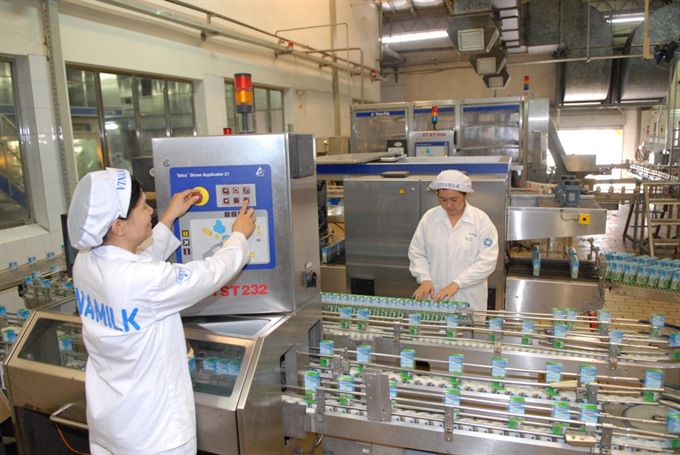 Economy
Economy

Results of transferring State ownership representative in enterprises to the State Capital Investment Corporation (SCIC) was disappointing, requiring more drastic measures to hasten the process.
 |
| A production line of national dairy firm Vinamilk. The State Capital Investment Corporation sold stakes of Vinamilk last year. Experts urged speeding up the transfer of State ownership to SCIC. - Photo brandsvietnam.com |
HÀ NỘI — The transfer of State enterprise ownership to the State Capital Investment Corporation (SCIC) has been disappointing, Nguyễn Đình Cung, Director of the Central Institute for Economic Management (CIEM), said at a conference in Hà Nội yesterday.
According to Cung, shifting enterprise ownership from ministries and provincial People’s Committees to the SCIC is an important solution to restructuring State-owned enterprises (SOEs), but the change requires more drastic measures to hasten the process.
By his analysis, ministries and local authorities lacked dynamism and even purposefully delayed the transfer, while the SCIC has been hesitant to take on struggling enterprises.
A CIEM report shows that 173 out of 234 SOEs that have required State ownership representative transfer to the SCIC from 2013 have failed to do so. Those include 32 enterprises under five ministries and the 141 under 27 cities and provinces.
The State capital in these 173 enterprises is estimated to total VNĐ82.6 trillion (US$3.6 billion).
A representative from SCIC said that as of December 2016, SCIC received the State ownership representatives from over 1,000 enterprises with a total book value of VNĐ9.9 trillion (estimated at VNĐ15 trillion at market value), accounting for just 1 per cent of State enterprise capital.
The result was disappointing. The Government previously asked ministries and provincial authorities to hasten the transfer and complete the process by the first quarter of this year.
SCIC also said that over 80 per cent of the enterprises that have received the State ownership representative were of small sizes and inefficient operation.
“The transfer of State capitals to SCIC is stagnant despite the Prime Minister’s push,” Nguyễn Hồng Hiển, Deputy General Director of SCIC said at the conference.
In addition, several SOEs sold part of State capital to subsidiaries before transferring to the SCIC, which was not compliant with the Prime Minister’s directive, Hiển said.
Phan Đức Hiếu, Deputy Director of CIEM, said that many localities and ministries wanted to keep the right to manage SOE capital, arguing that their enterprise is necessary for the local development. Hiếu added that some just wanted to hand over weak enterprises to SCIC.
“The stagnation in transferring State ownership representative to SCIC reflects problems in reform,” Cung said, adding that special interest groups might be one element delaying the progress.
Cung said that many enterprises still wanted to be under ministries to easily ask for “special mechanisms”.
Economic expert Lưu Bích Hồ said that punishments for the delay and stagnation remained too light, adding that accountability must be clarified.
Experts at the conference also stressed the importance of establishing a special committee, which will act as a representative of the State capital at enterprises.
The Prime Minister previously asked the Ministry of Planning and Investment to submit the project by the end of February.
According to the SCIC, most enterprises that it received were structured with an average return on equity ratio of 15-17 per cent. — VNS




